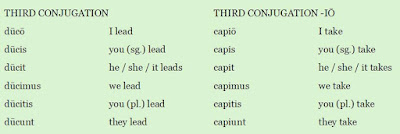This post follows on from the previous posts on 3rd and 4th conjugation verbs.
Links:
Level 1; Road to
Latin [33]; [i] In peristȳlō [ii] Dē equō
ligneō; (2) grammar: 3rd conjugation verbs
https://adckl.blogspot.com/2025/05/220825-level-1-road-to-latin-33-i-in.html
Level 1; Road to
Latin [34]; [i] In peristȳlō [ii] Dē equō
ligneō; (3) grammar: 3rd conjugation verbs; links
https://adckl.blogspot.com/2025/05/220825-level-1-road-to-latin-34-i-in.html
Level 1; Road to
Latin [35]; [i] In peristȳlō [ii] Dē equō
ligneō; (4) grammar: 4th conjugation verbs
https://adckl.blogspot.com/2025/05/250825-level-1-road-to-latin-35-i-in.html
Level 1; Road to
Latin [36]; [i] In peristȳlō [ii] Dē equō
ligneō; (5) grammar: 4th conjugation verbs; links
https://adckl.blogspot.com/2025/05/250825-level-1-road-to-latin-36-i-in.html
I leave this
conjugation until last because it is formed partly from the 3rd
conjugation and partly from the 4th i.e. it is better to be familiar
with the 3rd and 4th before looking at what is happening
in the 3rd-iō. The information below has been posted before:
https://adckl.blogspot.com/2024/04/180304-3rd-io-conjugation.html
https://www.facebook.com/groups/latinforstarters/posts/409226905021917/
However,
a summary is posted here again since it naturally follows on from what has
already been discussed.
If you look at the first image posted, you see two verbs side by side; in grammar books they are generally presented this way because both of them are classified as 3rd conjugation, the infinitive in short /e/. However, the verb on the right can be noted as [3-iō] although wiktionary (rather threateningly) lists this verb type as “third conjugation iō-variant”.
Why is it called
this?
[i] Here’s a 3rd
conjugation: bibō, bibere [3]: drink
bibō
>> bibis
<<
>> bibit <<
>> bibimus
<<
>> bibitis
<<
bibunt
[ii] Here’s a 4th
conjugation: audiō, audīre [4]: hear
>> audiō
<<
audīs
audit
audīmus
audītis
>> audiunt
<<
[iii] Now, the
final ‘tick box’ of the conjugations:
faciō, facere
[3-iō]: do; make
Take a second
look; the first person singular looks like audiō [4th conjugation] but
the infinitive is short /e/ -ere, like bibere [3rd conjugation], and
what emerges is a combination of the two:
[1] fáciō
[like 4th conjugation; compare audiō]: I do
Now it has the
endings of the 3rd conjugation:
[2] fácĭs
[compare: bíbĭs]: you (sg.) do
[3] fácĭt
[compare: bíbĭt]: he / she / it does
[4] fácĭmus
[compare: bíbĭmus]: we do
[5] fácĭtis
[compare: bíbĭtis]: you (pl.) do
Then …
[6] fáciunt
[like 4th conjugation: audiunt]: they do
The table below
shows the three conjugations – 3rd, 3-iō and 4th – side-by-side. The accent
marks [ʹ] and [˘] are only used here to show the
differences in stresses. Note the way in which the 3-iō conjugation is formed partly from the
third conjugation and partly from the fourth.
Compare the way in which 3rd, 3-iō and 4th
conjugations are listed:
dūcō, -ere [3]; -ō / -ere
capiō, -ere [3-iō]; -iō / -ere
audiō, -īre [4]; -iō / -īre
Some frequently occurring verbs are of the 3-iō type:
accipiō, accipere [3-iō]: receive
capiō, capere [3-iō]: take; capture
cupiō, cupere [3-iō]: desire
effugiō, effugere [3-iō]: flee / escape from
fugiō, fugere [3-iō]: flee
iaciō, iacere [3-iō] throw
interficiō, interficere [3-iō]: kill
rapiō, rapere [3-iō]: seize; of course, the
highly unpleasant word ‘rape’ is derived from this, but the original word,
which, yes, could mean ‘rape’ also had a far wider meaning of ‘snatch; carry
off; abduct’
Links
[1] further posts on the 3-iō conjugation
18.03.24: 3rd-iō conjugation
https://adckl.blogspot.com/2024/04/180304-3rd-io-conjugation.html
https://www.facebook.com/groups/latinforstarters/posts/409226905021917/
18.03.24: practice in the 3-iō conjugation
https://adckl.blogspot.com/2024/04/180324-practice-in-3-io-conjugation.html
https://www.facebook.com/groups/latinforstarters/posts/409455001665774/
[2] 3rd,
3-iō and 4th conjugations: all posts
[i] 3rd
and 3-iō conjugation
https://mega.nz/file/GB9HXJyQ#rAlmUqjUcF0fjIlKKbqo0F0MWGj0FQB5zIvwHM2EpVo
[ii] 4th
conjugation
https://mega.nz/file/aVUnDRwD#HnIrEIqAdtRrB4xOxakJ0v80ekm6Y60xt6xXhp0q5pA


No comments:
Post a Comment